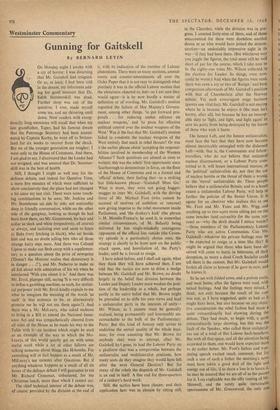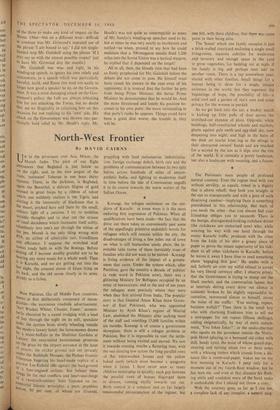Westminster Commentary
Gunning for Gaitskell
By BERNARD LEVIN ON Monday night I awoke with a cry of horror; I was dreaming that Mr. Gaitskell had resigned. Or so, at least, I had been told in the dream, my informant add- ing for good measure that Dr. Edith Summerskill was dead. Further sleep was out of the question; I rose, made myself some tea, and sat shivering until dawn. Now readers with excep- tionally long memories will recall that when my late grandfather, Taper, had his famous dream that the Patronage Secretary had been assassi- nated by Captain Kerby, he went off to Switzer- land for six weeks to recover from the shock. But we of the younger generation are tougher; I went only to the House of Commons. And there, I am glad to say, I discovered that the Leader had not resigned, and was assured that Dr. Summer- skill was in the best of health.
Still, I thought I might as well stay for the defence debate, and indeed for Question Time, a mere five minutes of which were sufficient to show conclusively that the place had not changed a bit since my last visit. There were some touch- ing combinations to be seen; Mr. Jenkins and Mr. Stonehouse sat side by side, not noticeably deep in friendly conversation, while on the other side of the gangway, looking as though he had been born there, sat Mr. Greenwood, his hair and collar as sleek and white (respectively, of course) as always, and inclining ever and anon to listen to Babs (very fetching in black), who sat beside him and was no doubt telling him who all those strange hairy m9n were. And there was Colonel Lipton to make our flesh creep with a supplemen- tary to a question about the price of newsprint (`Doesn't the Minister realise that democracy is in danger . . .?'), and Mr. Nabarro to make us all fall about with admiration of his wit when he interjected 'With you about it is.' And there was Mr. Errol, plumper still, saying 'It is very difficult to define a gambling machine, as such, for statisti- cal purposes' (will Mr. Errol kindly explain to me what he imagines the meaning of the words 'as such' in that sentence to be, or alternatively promise me he will not use them again?). And there was a Mr. McLeavy, who asked mcleave to bring in a Bill to amend the National Insur- ance Act and was sympathetically cheered from all sides of the House as he made his way to the Table with it—an incident which might be used as an example of the way in which the Me- Leavys of this world quietly get on with some useful work while a lot of other fellows are talking nonsense about things like H-bombs. For something will in fact happen as a result of Mr. MbLeavy's ten minutes after Questions. But if anything whatever happens as a result of all six hours of the defence debate I will guarantee to eat Mr. Richard Crossman, unbuttered, for my Christmas lunch, more than which I cannot say.
The chief technical interest of the debate was, of course, provided by the division at the end of it, with its indication of the number of Labour abstentions. There were so many motions, amend- ments and counter-amendments all over the Order Paper that it is not easy to distinguish what precisely it was in the official Labour motion that the abstainers objected to, but—as I am sure they would agree—it is by now hardly a matter of definition or of wording. Mr. Gaitskell's motion regretted the failure of Her Majesty's Govern- ment, among other things, `to put forward pro- posals . . . for reducing undue reliance on nuclear weapons,' and `to press for effective political control over the nuclear weapons of the West.' Was it the fact that Mr. Gaitskell's motion failed to condemn the nuclear weapons of the West entirely that stuck in rebel throats? Or was it the earlier phrase about 'accepting the responsi- bilities involved in membership of the Western Alliance'? Such questions are absurd as soon as written; this was the rebels' first opportunity since Scarborough to demonstrate in force, on the floor of the House of Commons and in a formal and 'official' debate, their feeling that—in a striking but little-known phrase—'Gaitskell Must Go.' What is more, they were not going hugger- mugger to inter Mr. Gaitskell; with the driving force of Mr. Michael Foot (who cannot be accused of motives of ambition or rancour) now giving impetus to the rebel movement inside Parliament, and 'the donkey's kick' (the phrase I., M. Mendes-France's; he used it, in somewhat similar circumstances, of M. Bidault) being, delivered by less single-mindedly courageous opponents of the official line outside (the Coven- try episode is a particularly choice one), the strategy is clearly to be from now on the public attack upon, and humiliation of, the Party's leader, until he is forced to resign.
I have asked before, and I shall ask again, what they think they will have achieved then. I am told that the tactics are now to drive a wedge between Mr. Gaitskell and Mr. Brown, no doubt largely in the belief that division between the Leader and Deputy Leader must weaken the posi- tion of the leadership as a whole, but perhaps partly in the naïve belief that Mr. Brown might be prevailed on to stifle his own views and lead a unilateralist party in the interests of unity— Mr. Wilson, as I assume must be generally realised, being permanently and irrevocably un- stomachable to the bulk of the Parliamentary Party. But this kind of fantasy only serves to underline the unreal quality of the whole busi- ness; for even assuming that Mr. Brown (or anybody else) were to attempt, after Mr. Gaitskell ha4 gone, to lead the Labour Party on a platform that was a compromise between the unilateralist and multilateralist positions, how many seats do they imagine they would have left after the next General Election? But for many of the rebels the dispatch of Mr. Gaitskell is an end in itself. A fine end for three-quarters of a century's hard work.
Still, the tactics have been chosen; and their application here was to abstain by sitting still, in the Chamber, while the division was in pro- gress. I counted forty-nine of them, and of those unaccounted for there were doubtless anothet dozen or so who would have joined the demon- stration—an undeniably impressive sight in its way—if they had been there. (But whichever way you juggle the figures, the total must still be well short of par for the course, which I take now to be the eighty-one votes Mr. Wilson collected in the election for Leader. So things, even now, could be worse.) And when the figures were read, there was even a cry or two of 'Resign,' and busy comparison afterwards of Mr. Gaitskell's position with that of Chamberlain after the Norway debate. Yet such extravagant stage business ignores one vital fact; Mr. Gaitskell is not staying where he is because he enjoys it (the man isn't barmy, after all), but because he has an inescap- able duty to 'fight, and fight, and fight again' to save his party from being destroyed by the forces of those who wish it harm.
The honest Left, and the honest unilateralists, must face the fact that they have now become almost inextricably entangled with the dishoncsl Left—with, that is, the Communists and fellow. travellers, who do not believe that unilateral nuclear disarmament, or a Labour Party coim mitted to it, will lessen international tension, a! the 'political' unilateralists do, nor that the use of nuclear bombs or the threat of them is wrong, as the 'moral' unilateralists do. These people believe that a unilateralist Britain, and to a lesset extent a unilateralist Labour Party, will help tc further the policies of the Soviet Union. It agony for an observer who realises this to set Mr. Foot and Mr. Yates and Mr. Wigg and anything up to two score more sitting put on thc same benches (and ostensibly for the same rea. sons) as--why the devil should I mince words'i —those members of the Parliamentary Labatt' Party who are active Communists. Can Mr Gaitskell—whatever his private feelings may be —be expected to resign at a time like this? 1.1 might be argued that those who have been de' ceived will come to learn, in bitterness, of thcii deception, as many a dead Czech Socialist could tell them is the custom. But Mr. Gaitskell wool( forfeit all claim to honour if he gave in now, and he knows it.
So he sat with folded arms, and a patient smile and went home, after the figures were read, will mixed feelings. And the feelings were mixed, think, not only because the result of the 'ot( was not, as I have suggested, quite as bad as it might have been, but also because on any objec tive consideration the rebel faction had made I quite extraordinarily bad showing during the debate. They had made, to begin with, a quite extraordinarily large showing, but this was the fault of the Speaker, who called three unilateral ists out of a total of five Labour back-benchers But with all that space, and all the attention being accorded to them, one would have expected then] to do rather better. Mr. Foot's listless and wan dering speech excited much comment, but for such a son of such a father the morning's news must have taken a good deal of the light and energy out of life; if to share a loss is to lessen he may be assured that we are all of us the poorer for it. Less explicable was the silly ranting of MI Shinwell. and the surely quite inexcusable speciousness of Mr. Greenwood, the only one of the three to. make any kind of impact on the House. (Also—but on a different level—difficult to condone was Mr. Grimond's repeated use of the phrase 'I am bound to say.' I did not single- handed stop Mr. Gaitskell using the phrase 'If I May say so with the utmost possible respect' just to have Mr. Grimond don the mantle.)
Mr. Gaitskell was wise and right, in his Winding-up speech, to ignore his own rebels and concentrate, in a speech which was particularly forceful, lucid, and fluent (we tend too easily to forget how good a speaker he is), on the Govern- Ment. It was a most damaging attack on the Gov- ernment's policy; the Left are always criticising hint for not attacking the Tories, but no doubt they see no illogicality in criticising him on this occasion for not replying to his 'own' side. His attack on the Government was thrown into par- ticularly bold 'relief by Mr. Heath's reply. Mr. Heath's was not quite as contemptible as many of Mr. Sandys's winding-up speeches used to be, but at times he was very nearly as incoherent and rattled—as when, pressed to say how he could maintain that a 500-megaton missile fired 1,200 miles into the Soviet Union was a tactical weapon, he replied that it depended on the target!
All in all, then, the bloody ruin that had been so freely prophesied for Mr. Gaitskell before the debate did not come to pass. He himself must have raised his stature in the eyes even of his opponents; it is ironical that the farther he gets from being Prime Minister, the better Prime Minister he demonstrates that he would be. And the more threatened and lonely his position be- comes in his own party, the more outstanding in that party's ranks he appears. Things could have been a great deal worse; the trouble is, they will be.



































 Previous page
Previous page